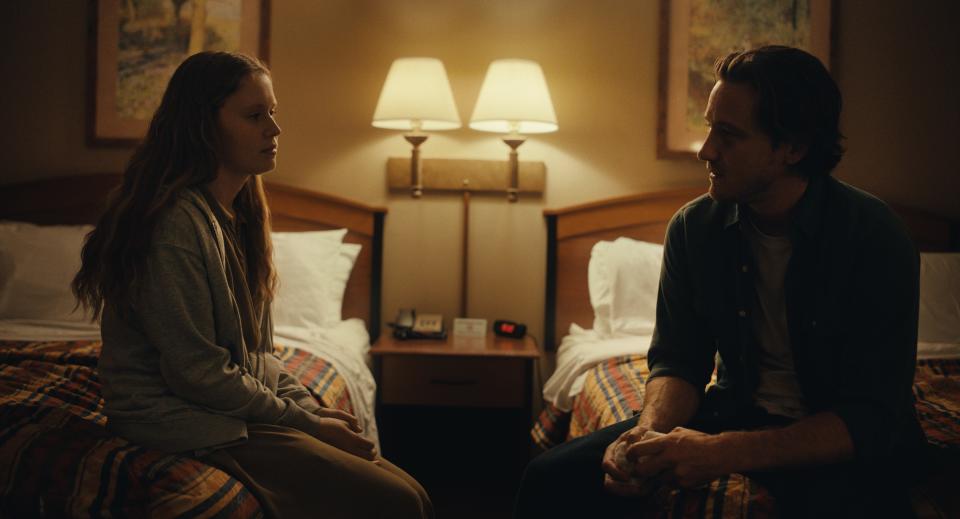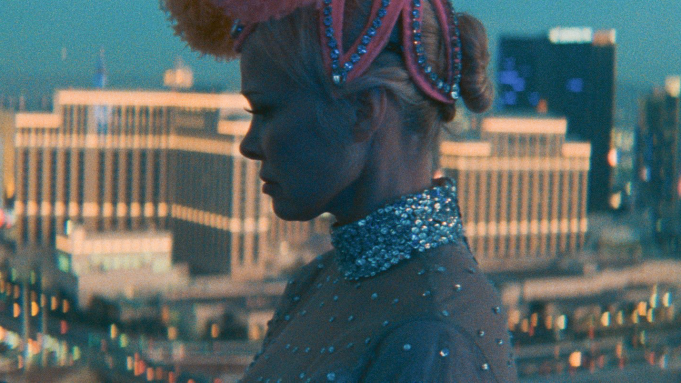The Rising Producers Trusted by Andrea Arnold, Scarlett Johansson, and Gia Coppola to Make Their Films

The stats are impressive enough: In just three-and-a-half years of existence, Pinky Promise Films have produced a dozen films (including festival hits like Andrea Arnold’s recent Cannes entry “Bird” and Laurel Parmet’s Sundance breakout “The Starling Girl,” plus much-hyped new features from Scarlett Johansson and Gia Coppola), grown to six total employees, and debuted one heck of a cute website.
But for founder and CEO Jessamine (AKA “Jesse”) Burgum and president Kara Durrett, there’s another, slightly less quantifiable measurement they really like to see grow: people are calling them to produce their projects.
More from IndieWire
“We’re just entering into this wonderful era right now with Pinky Promise where people now know about us,” Durrett said during a recent interview with IndieWire. “People would not call us first, I would say, for a little while, because they just didn’t know who we were. We are now entering this magical place where we’re getting cold emails from filmmakers that we are obsessed with being like, ‘Hey, I just was at a dinner and everyone just kept talking about you guys. Who are you? And what are you trying to do?’ That’s what we’ve always wanted.”
What they’re trying to do is a heady mix of industry disruption, creative support, and a little bit of secret sauce (on said cute website, their intentions are listed from the jump: they want to make films with “heart, creativity, and magic”). As with some of Hollywood’s best producers, the path there was a little circuitous. Both Burgum and Durrett first imagined being in the industry on the other side of the camera.
Texas native Durrett went to NYU for acting, where she “learned very quickly I didn’t want to be an actor.” But that didn’t shake her desire to be in the industry. After she graduated, she worked as a celebrity assistant for a spell.
“It was the most formative experience,” Durrett said. “I took a job as an assistant because I was like, ‘You know what? I’ll learn about the industry this way. It’ll be a quick way to do it.’ And I did. I learned a lot that I didn’t want to know, and I still have that information in my head. And I’ve learned so much that I do want to know, so it helped me move forward into what I wanted to make myself.”
(The pair are always ideating, even during this interview. After Durrett mentioned her previous celebrity assistant gigs, Burgum said, “It would make the best reality TV in the world, but it’ll never be able to happen for obvious reasons. But the stories! I’m like, ‘Wow, that would make really good TV.’” Durrett added with a laugh, “Oh, yeah. We’ve talked about this before. How do we get a reality show of assistants? But they would never!”)
Burgum’s earliest dreams were also centered on performing (she even has a small role in “The Starling Girl”). “I was one of those crazy kids that knew that I wanted to be an actress since I could talk,” she said. “I was lucky to be born into a family that supported that, despite being from Fargo, North Dakota, where that was kind of an anomaly.” Burgum goes all-in on stuff, including her early performance dreams: she studied classical acting at the Guthrie in Minneapolis and Shakespeare’s Globe in London.

But while Durrett was dipping into producing (early works include “Save Yourselves!” and “Ayar”) — “Making shorts for fun with filmmakers that I loved, just kind of creating stuff, led to bigger things and to longer things, and it just kind of kept growing and growing,” she explained — Burgum was starting to wonder if acting was the only thing she was interested in pursuing.
“I moved out to LA to do the acting thing, and I quickly was feeling uninspired by the work that I was going out for,” Burgum said. “I thought, ‘Oh, maybe someday I’ll get to have a production company and do that.’ But I thought that you had to be Reese Witherspoon first before you got to earn your stripes that way.”
Then the pandemic happened. The industry shut down. Burgum went back to North Dakota. “At the kitchen table surrounded by my family, who are all businesspeople, entrepreneurs, a lot of tech and VC background, I started putting some pieces together,” she said. “I was like, ‘I’m stuck at home. I don’t know when this thing’s going to end.’ It kind of puts things in perspective. Go shoot the moon now. We’ll see. In the middle of the pandemic, we launched a film production company with a laptop and a press release in the corner of my bedroom, and here we are.”
She launched Pinky Promise in January 2021, and her first release was a biggie: Adamma Ebo’s directorial debut “Honk for Jesus, Save Your Soul,” a favorite at the 2022 Sundance Film Festival that Focus Features, Peacock, and Monkeypaw Productions acquired distribution rights to for $8.5 million (it was released theatrically and on Peacock in September 2022).
The duo met on the set of Ebo’s film, which Durrett also produced (she was an independent producer at the time, though, she said she had been looking for a potential partner for awhile). So how did they first connect? “Look at her beaming,” Durrett said, gesturing at Burgum’s Zoom window. “We always tell it as our love story.” Burgum added, “It is!”
“You know those moments when you’re looking around a room of people and you make eyes with someone and you’re like, ‘You know what’s going on’?,” Durrett recalled. “We made those eyes to each other. We just became friends from then. She told me what she wanted to do and what she wanted to build. At first I was like, ‘Yeah, we’ll see. We all say a lot. It’s a really big industry.’ But she just kept doing it. She was like, ‘I’m going to raise money.’ Then she did. She was like, ‘I’m going to make movies by filmmakers of color.’ Then she did. Everything just kept happening. The more Jesse did, the more I was like, ‘Well, how do I work with you? Can I be in the club?’”

Burgum said she had her eye on Durrett from the start. “There’s no better way to see if you want to work with somebody than by seeing them doing what they’re good at,” Burgum said. “She was the person who knew the name of every single PA on set, knew when it was their birthday, and was optimizing the experience. I tell this story all the time, Kara went up to a PA and was like, ‘Hey, what are you hoping to get out of this experience? What are you wanting to do?,’ and they were like, ‘I think I’m really interested in learning about locations.’ So Kara made sure that that PA was the person who was going with the location scout that day.”
That was the kind of person Burgum wanted to work with, the kind she wanted to “court” to join her. (Durrett laughed, “It was not a hard court!”) Durrett joined Pinky Promise as president in 2022, capping off four years of independent producing and a previous gig at Tangerine Pictures.
“We talk a lot about at Pinky Promise that it’s not just about the movies that we’re making, it’s about how we make them,” Burgum said. “A lot of people like to use the no-asshole policy, which I agree, yes, but even a step above that, let’s make sure that this experience can be the best it can be for everybody. We’re in it because we love it. We have the coolest job in the world. We’re making movies. Life is short. Make it a great experience for everybody while you’re doing it.”
The stuff they bonded over early went beyond just loving movies, into a shared ethos that informs all the work at Pinky Promise. On its website, Burgum and Durrett lay out a four-point set of “unwavering principles” (do the right thing, right now; be all in; admit we don’t know, then find out; and embrace magic).
Burgum initially founded Pinky Promise with an eye toward using those same principles to uplift rising — and, often underrepresented — filmmakers, the kinds that Hollywood doesn’t typically bet on. While Pinky Promise has produced films from men and women of all races, creeds, orientations, and backgrounds, Burgum and Durrett’s interest in backing underdogs is clear. That’s not as fashionable in the industry as it was even when Burgum first started the company, as many other companies that brought on DEI initiatives and executives are now cutting them.
“It’s very disappointing obviously to see leaders in the industry that are making those type of cuts,” Burgum said. “Because it feels like, ‘Oh, did you really care about that in the first place or was that all for show?’ I think that on the flip side though, and [I’m] ever the optimist, the people, the companies, the institutions that do care about it genuinely are doubling down. For every company that’s like, ‘We’re cutting this. It’s not valuable,’ then you have your other companies that are like, ‘No, this is even more evidence to support why this is more important than ever.'”

In early days, Burgum said she didn’t even want to announce Pinky Promise’s exact mission — they could just do it — to avoid being lumped in with the kind of companies that now feel as if they were just jumping on a buzzy bandwagon.
“For a long time, we were almost hesitant to announce that this is what our mission was in a way, because we didn’t want to get grouped in with companies that felt like they were just saying this for points and for positive publicity,” Burgum said. “Really, we’re focused on walking the walk. I really look forward to the day when we don’t have to have conversations anymore, especially for these BIPOC artists, [that they don’t] have to have conversations anymore about why they have to advocate for why it’s important. That should not have to be a conversation we’re having anymore. It should just be a given. It’s so obviously important.”
With their mission and principles baked into everything they do, Burgum and Durrett are now busy, well, just doing it.
“We’ve always said we’re just going to keep making [these films],” Durrett said. “The longer we make them, the longer our resume speaks for itself. … It just takes a little more time. We struggle internally with what we’re being sent and what we’re trying to make. Our mind is, well, then let’s go out and find it. If we’re not being sent it, then let’s find it in different avenues. Let’s call every manager we know. Let’s call every other financier that we know that supports the same kind of films and see what they’re making. It just takes a little bit more effort. You’re going to make money. You’re going to make great movies.”
While Burgum and Durrett look in the usual places (film festivals) and the rising (TikTok) for talent, they’ve also found great success with good, old-fashioned blind submissions. Look no further than one of their next offerings: Scarlett Johansson’s directorial debut, the recently wrapped June Squibb-starring “Eleanor the Great,” which hails from first-time screenwriter Tory Kamen.
“The script we just made, Scarlett Johansson just directed, it was packaged, we set it up with Sony, it has its whole life. That script was sent to us as a total one-off,” Durrett said. “It was a friend of a friend of a friend who sent it our way. It’s about Judaism and it’s about aging, talk about diverse. We never see movies about people who are elderly or about people above a certain age. … That was a movie that was born out of a good script.”
And while it may be a new gig for Johansson, Burgum and Durrett are clear: she was born to be a filmmaker, and she fits perfectly into the still-evolving Pinky Promise mold.
“She’s not your typical first-time filmmaker,” Burgum said. “She has more on-set experience than everybody else combined, because she’s been doing it since she was a kid. She came in and she knew exactly what she wanted and knew exactly how she wanted to do it, had a crystal clear vision and how she wanted to execute it, because she’s been basically honing these skills for her entire career and finally found the right piece to be able to tell that story.”

Most importantly, they added, she also wasn’t afraid to ask for help, to bring in more team players to assist in achieving her vision.
“She also has a really strong base of filmmakers that she asks guidance for,” Durrett added. “She would text Noah Baumbach, ‘How would you do this transition?’ She just had so many wonderful people to be able to reach from and to get advice to help guide the process. How often, A, do you get that with a first-time filmmaker? And B, what a gift it is to get to see her do her thing. So it was really cool, very fun.”
Pinky Promise also produced Gia Coppola’s next film, the much-anticipated Pamela Anderson-starring drama “The Last Showgirl.” The film, which also stars Jamie Lee Curtis, Dave Bautista, Brenda Song, Kiernan Shipka, and Billie Lourd, is already being eyed for an Oscar run for Anderson.
“There’s just so much intentionality and heart around how Gia operates and [it was] just one of the most loveliest, warmest sets that you could possibly be on, just radiating good vibes,” Burgum said. “It’s Pam like you’ve never seen her. … We cannot wait. This is why I love female filmmakers, so much empathy towards the subject matter and such a loving lens towards the stories that she’s telling. I think people are going to be blown away just at the depth of emotion that Pamela is accessing and what she’s doing on screen.”
And while Pinky Promise is just one of a slew of producing shingles attached to the project, they’re the last people to balk at having too many creators in the room. They thrive on that energy.
“It was a play first, and as a bunch of theater nerds, we were just obsessed with the idea of that,” Durrett said. “We were obsessed with the story, with Pam. And we were lucky enough, that was one that we were brought in, to be honest, last minute. When we got the phone call, even before they were like, ‘Do you want to?,’ we were like, ‘Yes. Yeah, absolutely.’ … I think we just had one phone call, and within the one phone call, we knew exactly what they were trying to do. We knew exactly how they wanted to make it. It was just kind of a no-brainer to do it.”
Most recently, they took Andrea Arnold’s “Bird” to Cannes. The competition title boasts a stacked cast with Barry Keoghan and Franz Rogowski, and picked up strong reviews at the fest. It also landed a distributor in MUBI, which allegedly snapped it up after a major bidding war.
“We could not imagine a better going-to-Cannes-with-a-movie experience,” Durrett said. “What other filmmaker would you want to go to Cannes with besides Andrea Arnold? We want to really show people what kind of stuff we’re making on a bigger scale.”
“Scale” is something Durrett and Burgum mention a lot — they want to grow, but not in a way that would threaten their core values, the very reasons why they love Pinky Promise so much.
“We want to make bigger things, and not necessarily to say commercial things, I think that’s such a weird word, but we want to make things that people enjoy everywhere,” Durrett said. “We love making movies for our community. We also love making movies outside of our community. So we want to focus on that, and we really want to focus on just finding the next generation of filmmakers.”
What do the next five years look like for Burgum, Durrett, and Pinky Promise? They want “repeat customers,” they want to continue to find and support rising stars, and they want to stick to their guns. If the rest of Hollywood embraces that? All the better.
“I fantasize about looking at the Best Director nominees list and seeing just a whole bunch of Pinky Promise alumni,” Burgum said. “It’s not like we just want to make one big movie and then call it. We want to continue to make great movies and we also want to be continued to be known as smart, kind, good producers who people want on their team. That was always the goal.”
Best of IndieWire
Sign up for Indiewire's Newsletter. For the latest news, follow us on Facebook, Twitter, and Instagram.

 Yahoo News
Yahoo News 
